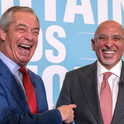Pacing like a caged lion against the backdrop of a slate-grey sky and Tony Blair’s “millennium wheel,” Gordon Brown today delivered a strong defence of electability as a core Labour value in a speech in London’s South Bank Centre. Few who were in the room would deny that it was powerful. The question is whether his intervention in the Labour leadership race—interpreted as a warning against voting for the left-wing platform of frontrunner Jeremy Corbyn, though Brown didn’t mention him by name—will have much effect on this most unpredictable of contests.
The speech was a Brown classic. While not as energetic as his appearance at a rally during last year’s Scottish independence referendum, this was a stirring, if slightly rambling, rampage through Labour’s history. The focus was unashamedly on defending the pursuit of power as a priority for the party. “Progress cannot be measured just by the passion with which we hold our ideals... It has to be measured by the real difference we make to the majority of people’s lives,” said Brown. He fired off quotations by Labour greats from party founder Keir Hardie to Aneurin Bevan to—unusually—his old rival Tony Blair in an attempt to show that seeking power is not an aberration for the party but one of its core values.
His best moment was his moving defence of his time in government shepherding the country through the cataclysm that was the Global Financial Crisis—the hard experience behind which made it more effective than similar efforts by Alan Johnson and other New Labour stalwarts. “We made mistakes. We would not be human if we did not make mistakes,” he cried, his voice resonating like a preacher’s, but “supporting people financially through a recession… as a result coming through the worst world recession with half the unemployment, half the bankruptcies and half the mortgage repossessions of the 1970s, 1980s and 1990s recessions—that was not a mistake.” The audience spontaneously applauded and Brown, a man who reportedly used to pound his desk at Number 10, groaning “Too. Many. Mistakes,” allowed himself a brief moment of rest.
But will it work? First, the timing is an issue. As one senior figure from the right of the party put it to me: “doesn’t it come a bit late?” In Brown’s speech he said his intervention was timed to coincide with the posting of ballot papers to the selectorate. But many people in the party’s mainstream think the time to strangle the Corbyn surge is long past.
Then there was the audience. Rather than striding out with a soapbox and addressing the voting hordes, Brown was speaking to a handful of people in a sterile room in London. His speech loses a lot without the delivery, and those glancing at coverage in the papers or on Twitter will see a few quotes that don’t look hugely different to the ones they’ve seen from Johnson, Blair and a host of others. His decision not to mention Corbyn by name means that coverage won’t leave the negative impression of Blair’s “heart transplant” gag. But it also means it might lack urgency and focus, and it means that the Corbyn campaign has been able to issue a response semi-endorsing the speech: "Gordon Brown has highlighted the need for a Labour party that stands for hope... on which basis the best candidate to vote for is Jeremy Corbyn."
But lastly, and most seriously, there is a fundamental weakness to using electability as an argument in this contest. As polling by YouGov shows, many people don’t think any of the candidates can win power in 2020. That rather takes the fire out of Brown’s point. Even if you agree that establishing the national minimum wage was worth 10,000 “principled” parliamentary speeches from opposition, you might think that principled speeches are worth more than five years of dithering and equivocation followed by another depressing defeat. The likely selection of the Blairite Tessa Jowell as the party’s candidate for London Mayor shows that a strong centrist candidate can still appeal. But a weak one enjoys neither the novelty factor nor the magnetism that comes with power. Arguably, Brown’s decision not to endorse a candidate—while perhaps understandable—makes this more serious. “Yes Gordon,” you want to say, “we know we should vote for someone who can win. But who can?”
Still, while Brown may not convince many new, lefty young signups, there was plenty here to give pause for thought to the wavering longer-term member whose heart may be with Corbyn, but whose head is elsewhere. “We are heartbroken,” said Brown “But… there’s one feeling that is an even worse feeling than heartbreak: powerlessness. To be heartbroken, yes, is terrible but to be powerless to do anything about it is worse. To see a wrong and not be able to right it. To witness injustice and not be able to halt it. To see fellow citizens in pain and not be able to stop the hurt and heal it.” In his voice as he said those words was an urgency born of the long road to power that he and Blair walked through the early years of the New Labour project. Few doubt that Brown’s politics have generally been driven by considered, conflicted judgement about what was best for the party. Some might find themselves facing a similar internal conflict—and coming to the same conclusion that Brown did, all those years ago.












